How Long Can You Go Without Water?
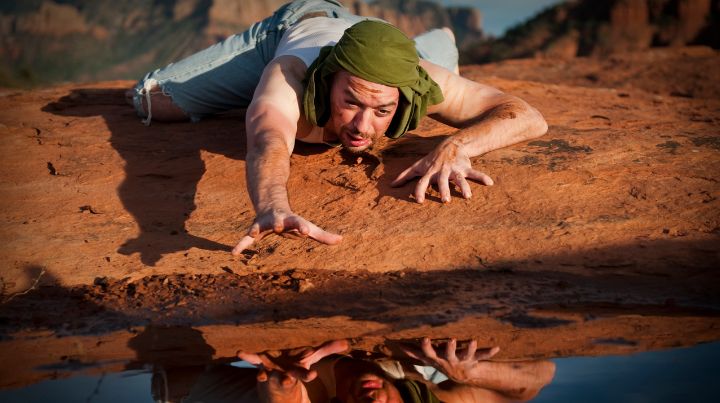
Do you know how long you can go without water? Water issues sit at the top of preppers’ minds, right next to food. Understandably so, given the importance and also the urgency of hydration for survival in short, mid, and long terms.
Even though the basics of water acquisition, transportation, storage, and treatment are well documented and constantly revisited everywhere, the matter of how long we can go without water is not discussed in the prepper-sphere as much. We at Mind4Survival set out to correct that and help increase your (de)hydration IQ.
Not a Rhetorical Question.
Before starting this article, I asked a couple of dozen people from my circle (coworkers, family, and friends – none of them preppers): “Do you know how long you can go without drinking water?”
I wanted to have an idea of the general public’s knowledge on the subject, considering the importance of water intake and proper hydration in our lives. The overwhelming majority responded with an interrogation, with most also missing the mark by a fair margin: “Two weeks? One month?”. Some came closer (“One week?”), with only five hitting the “how much water” nail on the head.
An accepted general rule of thumb states that a person can survive without water for between three to four days without water. Various factors play a role, so there is no definitive way to tell how quickly a person would die from dehydration.
However, dehydration can occur quickly, and a person may go from feeling thirsty and slightly sluggish on the first day with no water intake to having organ failure by the third. Some effects can even be felt in a matter of hours, depending on body and environmental conditions. It becomes life-threatening with as little water loss as 10 percent of body weight.
Water (And Hydration) Facts
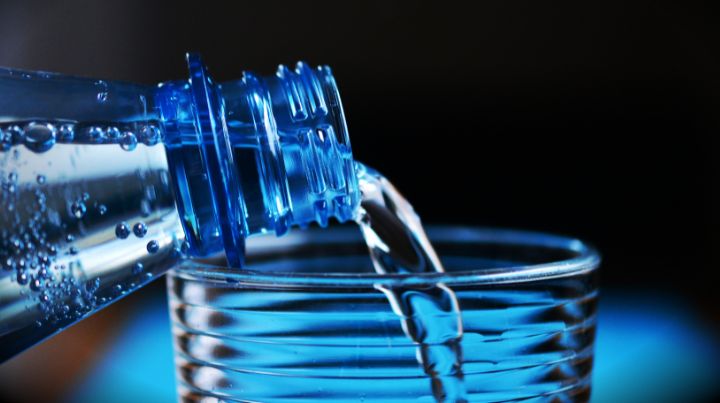
We use water to regulate body temperature, blood pressure, and blood volume; to dispose of toxins and waste; to balance pH; for chemical reactions and hormone use; for oxygen delivery, digestion, and lots more. In fact, every process constantly requires lots of pure water. Including muscle contraction and proper brain functioning: cognition, reflexes, and motor skills decline fast as water is lost or directed by the body to maintain vital organs working.
This leads us straight to the heart of the water balance and hydration matter: proper functioning is critical for survival, especially when things go awry. In other words, even though a person may be able to stay alive for up to ten or more days without drinking water, essential faculties start deteriorating as soon as mild dehydration sets in, which can happen when water loss reaches 1 percent of body weight.
This is the main takeaway here: we need to remain sharp-minded and in good physical shape if SHTF and water intake plays a significant role in that.
Dehydration Rate

We’re constantly losing water to the environment, even during sleep (about 1 liter or 4oz. on average). The ratio of lost water to water intake will determine the level of hydration and, consequently, the onset of dehydration.
Learning about the ways and rates people lose fluid, how to calculate daily water consumption needs and how much water you have to drink a day can provide valuable knowledge on the workings of drinking water and how long we can survive without water.
Average lost water through breathing can range from 200 ml to 1500 ml per day. Loss from sweating can range from 17oz. (500 ml) at rest in a cool environment, to 10 times that amount (340oz./10 liters) during exercise in the heat. Fecal losses can span from less than 4oz. or 100 ml per day when on a normal diet to over 1000oz. (32 liters) or more in someone with diarrhea. Urine volume is usually 700 ml of liquid per day. The above figures are for healthy adults.
Factors and conditions affecting these primary functions will determine the rate people lose water. The two main factors are environment temperature and humidity and exercise intensity (more heat/exertion equals more water loss). Other less known factors affecting hydration level and drinking water consumption/disposal are body composition, sex, age, weight, diet, and training level.
Some General Principles
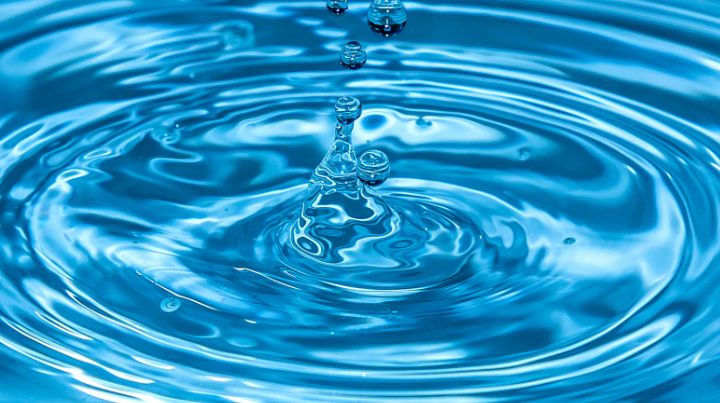
Dehydration Doesn’t Affect Every Person in the Same Way
Metabolism and physiology vary among everyone. Some people need to drink water more frequently, while others require less fluid, whether during normal or intense activities.
Likewise, some people can perform well in hot weather, and others may lose water quickly or have a severe decline when exercising or even staying in the sun or warm environments. We can learn about those limits and ourselves by testing, exercising, and competing frequently in different conditions.
Bigger People Generate More Heat
Body mass and surface area affect perspiration. More muscle mass also plays a role, as muscle produces more heat than fat, which tends to increase perspiration. In other words, larger people need even more water and should know how much water they require.
How Much Water Is in the Human Body
Water constitutes about 70 percent of body weight in the normal adult on average and decreases from 75 percent at birth to 50 percent in old age. As we age, sweat glands also change and lose efficiency, and our body becomes less tolerant to heat at the same time.
Fit People Require Less Water Intake
People who are very fit sweat more than their less-fit counterparts, but if performing the same task, the more-fit person will sweat less because they have to expend less energy to perform the same task.
Electrolyte Balance Is Important
We lose sodium chloride, potassium, calcium, and magnesium, particularly through sweat. These play a major role in muscle and brain activity, and lower levels can cause cramps, loss of coordination, and capacity to focus, among other conditions.
Diet Can Affect Hydration in Various Ways
Foods rich in water contribute to hydration. Others have the opposite effect: dry and spicy foods can act as thermogenics, increasing body temperature and thus sweating. Salty foods change the bodily fluid balance and increase thirst. Too much sodium throws the kidneys out of whack, pulling water from the cells and increasing dehydration. A high-protein diet demands more water to excrete the products of protein metabolism as well.
Avoid Alcohol and Caffeine
Drinks containing alcohol or caffeine may dehydrate the body faster, as they cause excessive urination. Some drinks contain excessive sodium as well. And never, ever drink seawater.
Health Level and Medications Can Impact Hydration
Certain conditions and medications can affect fluid balance and hydration levels. Some people sweat excessively in specific areas, such as palms or feet, a condition called hyperhidrosis. It can be medically treated or controlled. Be mindful of medications that can affect fluid absorption and elimination, sweating, urination, and so on. If in doubt, ask your doctor what is enough water for you.
Adequate Hydration Levels Help Regulate a Healthy Human Body
Proper hydration helps to regulate body temperature, blood pressure, and blood volume. Because of its impact on body temperature and blood volume, it is especially important to stay hydrated when operating in a hot climate. In addition, when working in a hot environment, taking breaks every few hours to rest and have some fluid intake can help you to avoid overheating and low blood volume.
Summary (And Bonus Hydration Tips For Preppers)
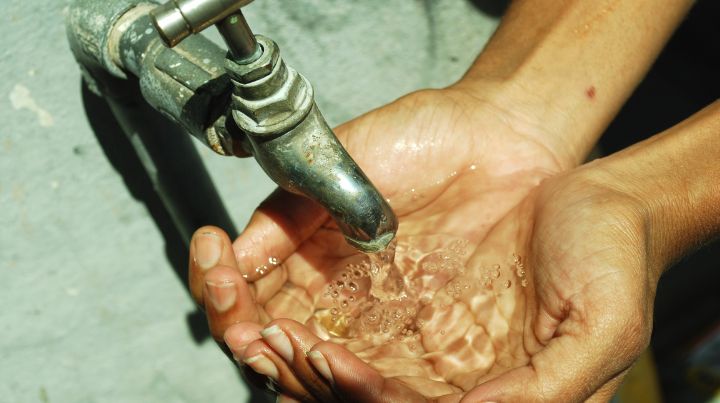
The average person can survive between two to four days without water, depending on internal and external conditions. It is possible to survive two or three weeks without ingesting any water if circumstances are favorable and no other serious condition is present.
Even then, motor and brain function may be affected and decay after a short period, impacting performance. This should be the main takeaway here, as proper performance is critical for survival whenever SHTF.
Without water, the symptoms of dehydration can appear quickly. If the body starts to lose water, it may send signals to the brain to trigger a response that the person will notice. Most people are familiar with minor symptoms of dehydration, such as dry mouth or feeling very thirsty.
Stay Aware and Alert!
It’s important to stay aware and alert to the symptoms of dehydration and take measures in advance to avoid further stages ASAP: The human body cannot adapt to a chronic water deficit, so fluid losses must be constantly replaced if physiological function is to continue unimpaired [SOURCE].
- Sip on a sports drink containing carbohydrates and electrolytes (sodium chloride, potassium, calcium, and magnesium).
- Replenish lost fluids with 16 to 20 ounces of clean drinking water per hour (four to six ounces for every 15 to 20 minutes). Important: Adjust quantities to your personal physiology and needs.
- Learn how to acquire, treat, store and transport water – and never skip the opportunity to do so. Those are basic prepping skills.
- And always have the means at hand to perform the above tasks. That’s an essential prepping rule.
What about you? Do you know how long you can survive without water? Have you had any experiences going without water and becoming dehydrated? Any tips and strategies to avoid dehydration? Please share in the comments.
Additional Resources:
- Easy DIY Water Storage for Frugal Preppers
- How to Purify Water for Drinking
- Dehydration Facts: Everything You Need to Know
- SHTF Food Storage Tips for Starting a Stockpile
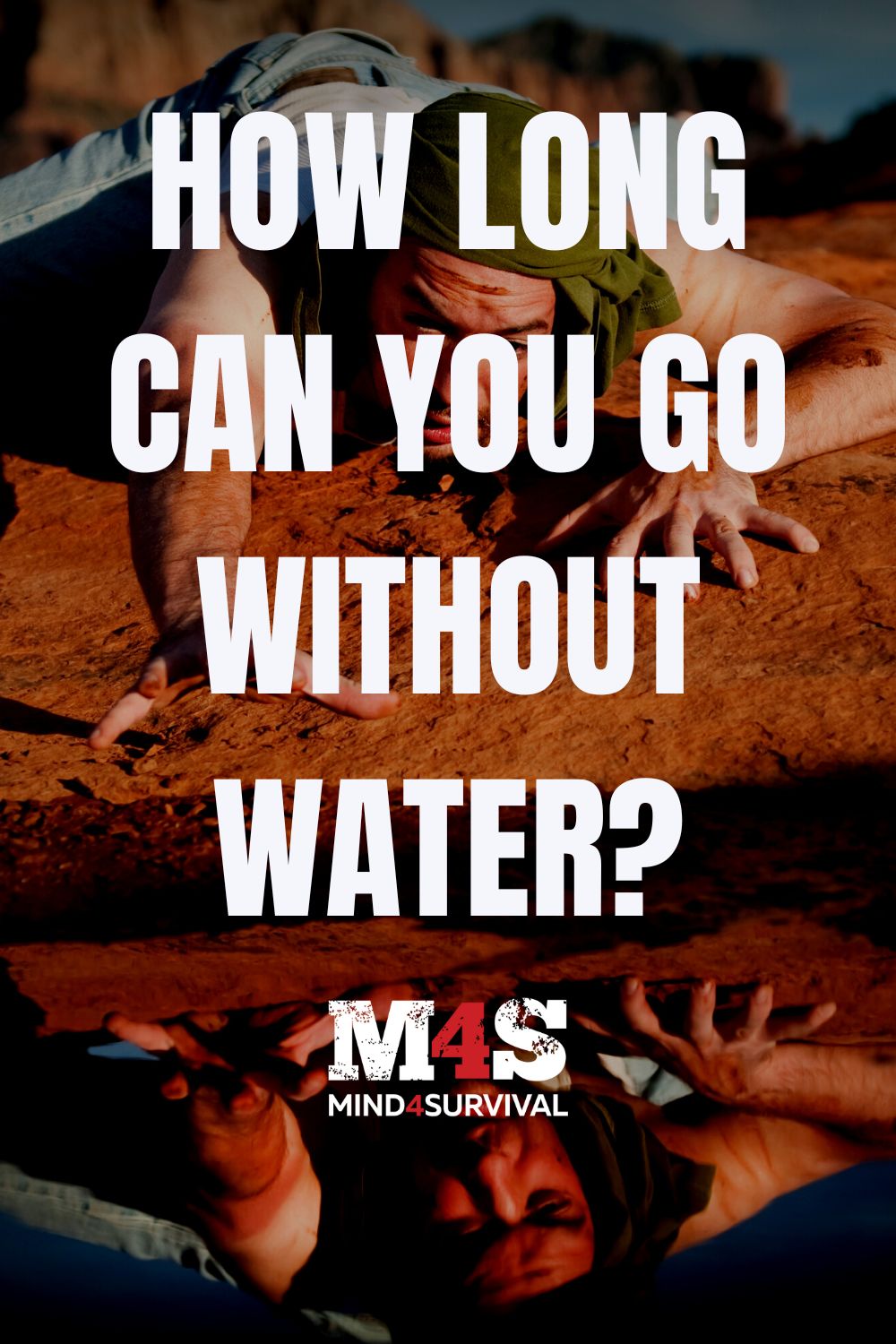
Don't Miss Out!
Join the thousands of people who rely on Mind4Survival preparedness advice by subscribing to our FREE newsletter.
- Practical preparedness information
- Zero Spam
- < 0.25% of people unsubscribe




Join Mind4Survival!
Stay informed by joining the Mind4Survival! 100% Secure! 0% Spam!
Follow Us!
Affiliate Disclosure
Mind4Survival is a free, reader-supported information resource. If you make a purchase through our link, we may, at no cost to you, receive an affiliate commission.

